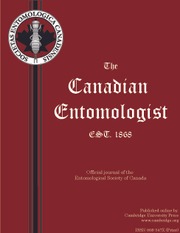Article contents
INTRA- AND INTERPOPULATION VARIATION IN THE THERMAL CHARACTERISTICS OF PREADULT DEVELOPMENT OF TWO LATITUDINALLY DIVERSE POPULATIONS OF TOXORHYNCHITES RUTILUS SEPTENTRIONALIS (DIPTERA: CULICIDAE)
Published online by Cambridge University Press: 31 May 2012
Abstract
Linear regression analysis was used to estimate the developmental threshold, t0, and thermal constant, K, for all preadult stages of two laboratory colonies of the mosquito Toxorhynchites rutilus septentrionalis (Dyar and Knab). The colonies originated from Newark, Delaware and Lake Charles, Louisiana. The physiological and ecological significance of the within- and the between-population differences in the slopes of the regressions,t0's and K's, are discussed.
Résumé
L'auteur utilise une analyse de régression linéaire pour estimer le-seuil de développement (t0) et la constante thermique (K) de tous les stades juvéniles de deux colonies de moustiques Toxorhynchites rutilus septentrionalis (Dyar et Knab) élevés en laboratoire. Les colonies proviennent de Newark, dans le Delaware, et de Lake Charles, en Louisiane. Il explique aussi la portée physiologique et écologique des différences de pente dans les courbes des analyses de régression calculées avec les deux variables au sein d'une même population et entre deux populations différentes.
- Type
- Articles
- Information
- Copyright
- Copyright © Entomological Society of Canada 1983
References
- 9
- Cited by


